-
A Conversation with Marisa O. Ensor on Securitizing Youth and Youth’s Role in Peace and Security Agendas
› “I’ve been quite impressed by the wide diversity and complexity of young women’s and men’s engagement for peacebuilding and development often while confronting seemingly insurmountable challenges,” says Marisa O. Ensor, Adjunct Professor in the Justice and Peace Studies Program at Georgetown University, in this week’s Friday Podcast.
“I’ve been quite impressed by the wide diversity and complexity of young women’s and men’s engagement for peacebuilding and development often while confronting seemingly insurmountable challenges,” says Marisa O. Ensor, Adjunct Professor in the Justice and Peace Studies Program at Georgetown University, in this week’s Friday Podcast. -
Native American Midwives Help Navajo Families Thrive
› When Navajo Midwife Nicolle Gonzales talks with Native American women about birth, there’s a sense something is missing, she said in this week’s Friday Podcast. “But,” she said, “we don’t know what it is.” Gonzales grew up and remains on a Navajo Reservation in New Mexico. She became a midwife and founded the Changing Woman Initiative (CWI) to address unmet maternal health care needs in her community. She is of the Tl’aashchi’I, Red Bottom clan, born for Tachii’nii, Red Running into the Water clan, Hashk’aa hadzohi, Yucca fruit-strung-out-in-a line clan, and Naasht’ezhi dine’e, Zuni clan.
When Navajo Midwife Nicolle Gonzales talks with Native American women about birth, there’s a sense something is missing, she said in this week’s Friday Podcast. “But,” she said, “we don’t know what it is.” Gonzales grew up and remains on a Navajo Reservation in New Mexico. She became a midwife and founded the Changing Woman Initiative (CWI) to address unmet maternal health care needs in her community. She is of the Tl’aashchi’I, Red Bottom clan, born for Tachii’nii, Red Running into the Water clan, Hashk’aa hadzohi, Yucca fruit-strung-out-in-a line clan, and Naasht’ezhi dine’e, Zuni clan. -
Dr. Raj Panjabi on the Importance of Community-Based Health Systems in Pandemic Response
› If there’s anything about responding to an epidemic, it’s that speed matters, and so does investing in people closest to the problem, said Dr. Raj Panjabi, Assistant Professor of medicine at Harvard Medical School and CEO of Last Mile Health, in this week’s Friday Podcast. The latter, he said, is the root of resilience.
If there’s anything about responding to an epidemic, it’s that speed matters, and so does investing in people closest to the problem, said Dr. Raj Panjabi, Assistant Professor of medicine at Harvard Medical School and CEO of Last Mile Health, in this week’s Friday Podcast. The latter, he said, is the root of resilience. -
The Importance of Community Trust to Combat COVID-19 Vaccine Hesitancy
› “Vaccine hesitancy is to be expected in a normal circumstance—it’s very different from being what we call ‘anti-vaccine,’” says Dr. Rahul Gupta, Senior Vice President and Chief Medical and Health Officer at March of Dimes, in this week’s Friday Podcast. He spoke at a recent Wilson Center event on ongoing efforts to develop and deliver a COVID-19 vaccine, co-sponsored by the University of Pittsburgh, March of Dimes, and the Jonas Salk Legacy Foundation.
“Vaccine hesitancy is to be expected in a normal circumstance—it’s very different from being what we call ‘anti-vaccine,’” says Dr. Rahul Gupta, Senior Vice President and Chief Medical and Health Officer at March of Dimes, in this week’s Friday Podcast. He spoke at a recent Wilson Center event on ongoing efforts to develop and deliver a COVID-19 vaccine, co-sponsored by the University of Pittsburgh, March of Dimes, and the Jonas Salk Legacy Foundation. -
The Resurgence of Indigenous Midwifery in Canada, New Zealand, and Mexico
› Globally, Indigenous women experience worse maternal health outcomes than non-Indigenous women. In the United States, the risk of maternal death is twice as high for Native women than for white women, while in Australia the risk is four and a half times higher. This week’s Friday Podcast highlights remarks from a recent Wilson Center event with the United Nations Population Fund (UNFPA) and the International Confederation of Midwives about Indigenous midwifery.
Globally, Indigenous women experience worse maternal health outcomes than non-Indigenous women. In the United States, the risk of maternal death is twice as high for Native women than for white women, while in Australia the risk is four and a half times higher. This week’s Friday Podcast highlights remarks from a recent Wilson Center event with the United Nations Population Fund (UNFPA) and the International Confederation of Midwives about Indigenous midwifery. -
Highlights from the First-Ever State of the World’s Nursing Report
›
The year 2020 has been designated as the Year of the Nurse and the Midwife by the World Health Organization. In April 2020, the World Health Organization (WHO), International Council of Nurses, and Nursing Now, published the first-ever State of the World’s Nursing Report. This week’s Friday Podcast highlights remarks from a recent Wilson Center event on the report’s findings and recommendations, gender implications in the health workforce, and the role of nurses during the COVID-19 pandemic.
-
Unpacking Covid-19 and the Connections Between Ecosystems, Human Health, and Security
› “What are the underlying drivers of risk that created the conditions for Covid-19 to emerge, and how do we better address them?” said Lauren Herzer Risi, Project Director for the Environmental Change and Security Program, in this week’s Friday Podcast, recorded during a recent Wilson Center Ground Truth Briefing on the Covid-19 pandemic. This question framed the discussion, which explored the intersection of the environment, public health, and national security. Although the global pandemic came as a shock to many, the novel coronavirus was not a surprise to epidemiologists and experts who had been sounding the alarm for decades. There have been clear signals of the risks we face from animal-to-human virus transmission, including Ebola, SARS, and other regional epidemics, said Risi. These zoonotic diseases, especially now, are creating concerns about food safety, wildlife conservation, and public health. But the risks don’t just come from wet markets and our increasingly connected world.
“What are the underlying drivers of risk that created the conditions for Covid-19 to emerge, and how do we better address them?” said Lauren Herzer Risi, Project Director for the Environmental Change and Security Program, in this week’s Friday Podcast, recorded during a recent Wilson Center Ground Truth Briefing on the Covid-19 pandemic. This question framed the discussion, which explored the intersection of the environment, public health, and national security. Although the global pandemic came as a shock to many, the novel coronavirus was not a surprise to epidemiologists and experts who had been sounding the alarm for decades. There have been clear signals of the risks we face from animal-to-human virus transmission, including Ebola, SARS, and other regional epidemics, said Risi. These zoonotic diseases, especially now, are creating concerns about food safety, wildlife conservation, and public health. But the risks don’t just come from wet markets and our increasingly connected world. -
Wim Zwijnenburg on Using Data to Visualize the Impacts of Conflict on the Environment
› Through open source information, remote sensing, and existing data, we can have a better sense of how conflict impacts the environment and how it then impacts people depending on the environment, said Wim Zwijnenburg, a Humanitarian Disarmament Project Leader for the Dutch peace organization, PAX, in this week’s Friday Podcast. Wim sat down for an interview with ECSP’s Amanda King at the first International Conference on Environmental Peacebuilding, hosted at the University of California, Irvine, in October 2019.
Through open source information, remote sensing, and existing data, we can have a better sense of how conflict impacts the environment and how it then impacts people depending on the environment, said Wim Zwijnenburg, a Humanitarian Disarmament Project Leader for the Dutch peace organization, PAX, in this week’s Friday Podcast. Wim sat down for an interview with ECSP’s Amanda King at the first International Conference on Environmental Peacebuilding, hosted at the University of California, Irvine, in October 2019.
Showing posts from category podcast.


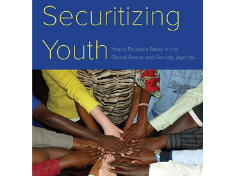 “I’ve been quite impressed by the wide diversity and complexity of young women’s and men’s engagement for peacebuilding and development often while confronting seemingly insurmountable challenges,” says Marisa O. Ensor, Adjunct Professor in the Justice and Peace Studies Program at Georgetown University, in this week’s Friday Podcast.
“I’ve been quite impressed by the wide diversity and complexity of young women’s and men’s engagement for peacebuilding and development often while confronting seemingly insurmountable challenges,” says Marisa O. Ensor, Adjunct Professor in the Justice and Peace Studies Program at Georgetown University, in this week’s Friday Podcast.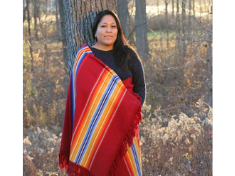 When Navajo Midwife Nicolle Gonzales talks with Native American women about birth, there’s a sense something is missing, she said in this week’s Friday Podcast. “But,” she said, “we don’t know what it is.” Gonzales grew up and remains on a Navajo Reservation in New Mexico. She became a midwife and founded the
When Navajo Midwife Nicolle Gonzales talks with Native American women about birth, there’s a sense something is missing, she said in this week’s Friday Podcast. “But,” she said, “we don’t know what it is.” Gonzales grew up and remains on a Navajo Reservation in New Mexico. She became a midwife and founded the 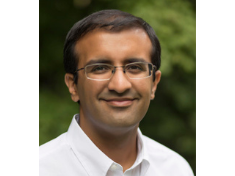 If there’s anything about responding to an epidemic, it’s that speed matters, and so does investing in people closest to the problem, said Dr. Raj Panjabi, Assistant Professor of medicine at Harvard Medical School and CEO of Last Mile Health, in this week’s Friday Podcast. The latter, he said, is the root of resilience.
If there’s anything about responding to an epidemic, it’s that speed matters, and so does investing in people closest to the problem, said Dr. Raj Panjabi, Assistant Professor of medicine at Harvard Medical School and CEO of Last Mile Health, in this week’s Friday Podcast. The latter, he said, is the root of resilience. “Vaccine hesitancy is to be expected in a normal circumstance—it’s very different from being what we call ‘anti-vaccine,’” says Dr. Rahul Gupta, Senior Vice President and Chief Medical and Health Officer at
“Vaccine hesitancy is to be expected in a normal circumstance—it’s very different from being what we call ‘anti-vaccine,’” says Dr. Rahul Gupta, Senior Vice President and Chief Medical and Health Officer at 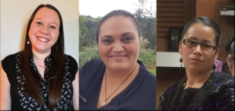 Globally, Indigenous women experience worse maternal health outcomes than non-Indigenous women. In the United States, the risk of maternal death is
Globally, Indigenous women experience worse maternal health outcomes than non-Indigenous women. In the United States, the risk of maternal death is 
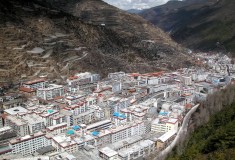 “What are the underlying drivers of risk that created the conditions for Covid-19 to emerge, and how do we better address them?” said Lauren Herzer Risi, Project Director for the Environmental Change and Security Program, in this week’s Friday Podcast, recorded during a recent Wilson Center
“What are the underlying drivers of risk that created the conditions for Covid-19 to emerge, and how do we better address them?” said Lauren Herzer Risi, Project Director for the Environmental Change and Security Program, in this week’s Friday Podcast, recorded during a recent Wilson Center 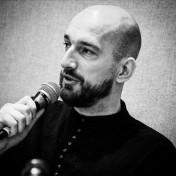 Through open source information, remote sensing, and existing data, we can have a better sense of how conflict impacts the environment and how it then impacts people depending on the environment, said Wim Zwijnenburg, a Humanitarian Disarmament Project Leader for the
Through open source information, remote sensing, and existing data, we can have a better sense of how conflict impacts the environment and how it then impacts people depending on the environment, said Wim Zwijnenburg, a Humanitarian Disarmament Project Leader for the 

